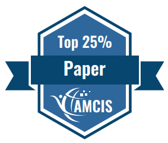SIG SEC - Information Security and Privacy
Loading...
Paper Type
ERF
Paper Number
1438
Description
This study investigates the effect of individuals’ information processing modes on phishing email detection mechanisms and accuracy. Drawing on the heuristic-systematic model of processing, mindful decision-making, and affect- and-persuasion literature, this paper examines the antecedents (i.e., heuristic processing, systematic processing, general and domain mindfulness, and affective state) and behavioral consequences (i.e., detection accuracy) in phishing identification. The study uses a survey experiment and collects 556 samples to examine the above (in the process). It aims to contribute to information security literature by identifying novel constructs (ICT mindfulness) and their effect on online users’ information processing capacity and detection accuracy. We also aim to contribute to phishing training and awareness by identifying the function of cognitive and affective factors on phishing detection accuracy. Finally, the affective states might help in improving the efficacy of automatic filters.
Recommended Citation
Bera, Debalina and Kim, Dan J., "The Interplay of Information Processing, Mindfulness, and Affective State in Phishing Detection" (2022). AMCIS 2022 Proceedings. 6.
https://aisel.aisnet.org/amcis2022/sig_sec/sig_sec/6
The Interplay of Information Processing, Mindfulness, and Affective State in Phishing Detection
This study investigates the effect of individuals’ information processing modes on phishing email detection mechanisms and accuracy. Drawing on the heuristic-systematic model of processing, mindful decision-making, and affect- and-persuasion literature, this paper examines the antecedents (i.e., heuristic processing, systematic processing, general and domain mindfulness, and affective state) and behavioral consequences (i.e., detection accuracy) in phishing identification. The study uses a survey experiment and collects 556 samples to examine the above (in the process). It aims to contribute to information security literature by identifying novel constructs (ICT mindfulness) and their effect on online users’ information processing capacity and detection accuracy. We also aim to contribute to phishing training and awareness by identifying the function of cognitive and affective factors on phishing detection accuracy. Finally, the affective states might help in improving the efficacy of automatic filters.
When commenting on articles, please be friendly, welcoming, respectful and abide by the AIS eLibrary Discussion Thread Code of Conduct posted here.




Comments
SIG SEC